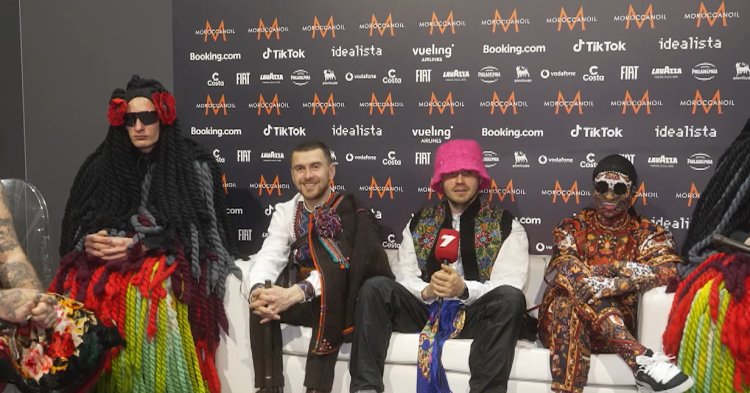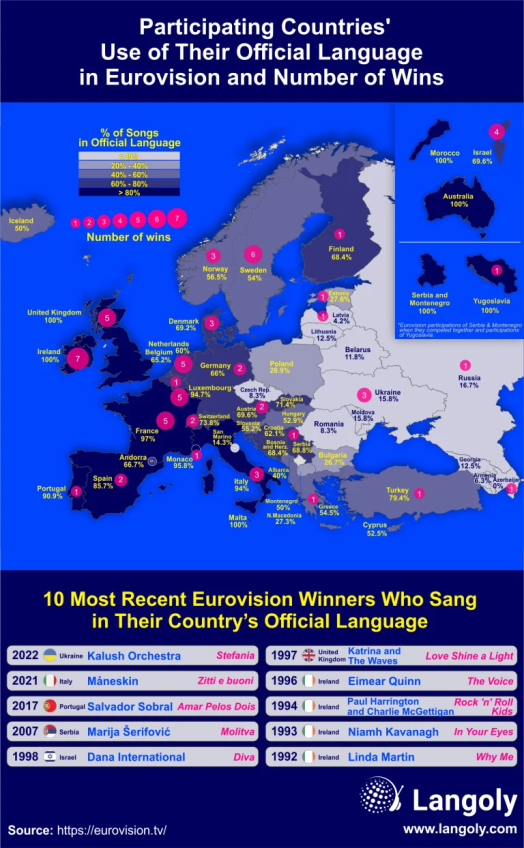On Saturday, May 13, people across the globe will tune in to watch the Eurovision Song Contest finals. What started as a small singing competition between a few countries has developed into a major international spectacle that pumps out #1 hits and turns contestants into international stars.
It’s a well-oiled machine, as it must be, in order to coordinate such a massive event. The rules are precise, from how many people can perform on stage to the maximum song length, and contestants must strictly adhere to them. But the rules surrounding what languages can be used never seem to be very permanent. Over the years, they have changed, changed back, and changed again.
There is an ongoing debate about what language contestants should sing in. While once only used in competition by the UK and Ireland, the English language has come to dominate the stage. Performers are opting out of the official languages of their countries for a more widely-understood one in an attempt to gain popularity with judges and fans. Is this a successful strategy though?
Eurovision: A Brief History
According to the Eurovision website, “The Eurovision Song Contest began as a technical experiment in television broadcasting: the live, simultaneous, transnational broadcast.” The first Eurovision Song Contest took place in 1956 with seven competing countries: the Netherlands, Switzerland, Belgium, Germany, France, Luxembourg, and Italy.
Each country submitted two entries and Switzerland was declared the first winner. It wasn’t until the 1958 contest that they established the precedent of the winning country hosting the next year’s event – a tradition that continues today, when possible.
In the following decades, the contest grew quickly, and the number of countries that participate has increased steadily. From the first competition with 7 countries, it grew to more than 20 in the 1980s and now generally has around 40 competing countries. 37 countries will perform at the 2023 contest.
To begin with, there was no rule on what language a country could perform in, and until 1965 every country used its national language. Sweden was the first country to break the norm that year by competing with a song in English. In the following year, organizers implemented the first rule that a country must compete using one of the country’s officially recognized languages.
The rule was abolished in 1973 but was reinstated again in 1977. However, Belgium and Germany were allowed to compete in English that year because they had already chosen their entries before the rule change was announced.
This time, the rule held for 22 years – until 1999. In that year’s competition, 14 of the 23 songs had English lyrics, and the majority use of the English language in the competition has held steady ever since.
Languages at Eurovision
The question remains if singing in English can give you a better chance of winning the competition. The clear answer so far has been yes, considering that 34 winning songs (or 46.6%) have been in English. Even if we remove Ireland’s 7 wins and the United Kingdom’s 5 wins (the two competing countries that have English as an official language), that’s still 22 times a country won by not singing in its official language.
Below you’ll see a visualization comparing the percent of entries each country has competed in a language that’s not their official language compared to the number of times the country has won.
The map presents some interesting patterns. We can see a trend from west to east. In general, Western countries compete more in their national languages, while Central and Eastern European countries favor non-official languages. However, when we compare that to the number of wins, it appears that Western European countries generally have more wins than Eastern European countries, suggesting a favorable correlation for singing in a native language.
And while the elimination of the language rule in 1999 led to a dramatic increase in English entries, we might finally be looking at a crest in the trend. Beginning in 2018, there’s been an increase in entries in languages other than English. In 2021, the top 3 finishers all sang in their country’s official languages, something that hadn’t happened since 1995. The 2022 winner, Ukraine, continued the trend by singing in its official language, Ukrainian.
While recent winners have sung in their country’s official language, it isn’t all that common. In the graphic, we can see the 10 most recent winners that sang in their country’s official language. The most recent was Ukraine in 2022 and the 10th was Ireland in 1992, a difference of 30 years.
Language Controversy and Trends
While singing in a non-official language has been allowed for many years and has become the norm, there are still people that aren’t happy with this decision. In 2008, the French contestant, Sébastien Tellier, sang the song “Divine” in English. This created controversy among those tasked with protecting the French language.
Alain Joyandet, the Secretary of State for Cooperation and Francophony, said, “When one has the honor of being selected to represent France, one sings in French.” French politician François-Michel Gonnot also launched a complaint toward the French broadcasting channel France-3, saying “The defense of the French language is part of the channel’s responsibility,” and called for Tellier to sing his Eurovision song in French.
More recently, Spanish contestant Ruth Lorenzo was criticized by the Real Academia Española, the government body for regulating the Spanish language, for her choice to sing “Dancing in the Rain” mostly in English. Ruth responded by saying, “English is a reality in Spain and I wanted to capture that in my song.” She went on to state that the chorus could only be in English.
Another interesting trend is the inclusion of other types of languages in performances such as imaginary languages and sign languages. Belgium was the first country to compete with a song in an imaginary language in 2003. Urban Trad, the Belgian contestant, won second place with their song, “Sanomi.” Belgium competed again with a song in an imaginary language in 2008 but with much less success. The Netherlands also sang in a mix of English and an imaginary language in 2006, also with little success.
There have been multiple times that sign language has been used as well. Five different countries have included sign language in their performances. However, the rules state that a song must have vocals and can’t be purely instrumental, so a song performed only in sign language is technically not permitted. However, these trends show the inclusion and growing popularity of different languages.
What to Expect at This Year’s Competition
Of the 37 countries, 28 will compete with a song completely in English or will include English lyrics to some degree. While this is a break from the trend of the past few years of including more official languages and less English, this could be due to the fact that English is the language of this year’s host country, the United Kingdom.
Conclusion
While this year we’re going to see a near-total domination of the English language at the Eurovision Contest, at the heart of the show, it’s about bringing people together for a shared experience. Despite being last year’s winner, Ukraine will not host the event due to safety concerns because of the continued invasion by Russia. Instead, they partnered with the United Kingdom, last year’s 2nd place contestant, and the show will take place in Liverpool. This year’s slogan is “United By Music” to show the partnership between the UK and Ukraine as well as the power of music to bring people together.


Follow the comments: |
|
